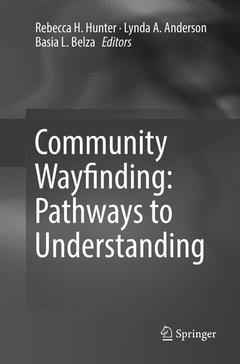Community Wayfinding: Pathways to Understanding, 1st ed. 2016
Coordonnateurs : Hunter Rebecca H., Anderson Lynda A., Belza Basia L.

Brings together international experts to offer multidisciplinary perspectives on community wayfinding
Describes relevant design principles and practices by drawing upon architecture, communications, universal design (UD), planning, and engineering
Examines wayfinding tools and innovative technologies ranging from maps to apps to complex wayfinding systems
Date de parution : 06-2018
Ouvrage de 282 p.
15.5x23.5 cm
Date de parution : 05-2016
Ouvrage de 282 p.
15.5x23.5 cm
Thèmes de Community Wayfinding: Pathways to Understanding :
Mots-clés :
Examining community wayfinding; Individual wayfinding ability and performance; Science and human experience of wayfinding; Sensory; cognitive or age-related limitations; Urban planning; Environmental Psychology; Public health; landscape/regional and urban planning; urban geography and urbanism


